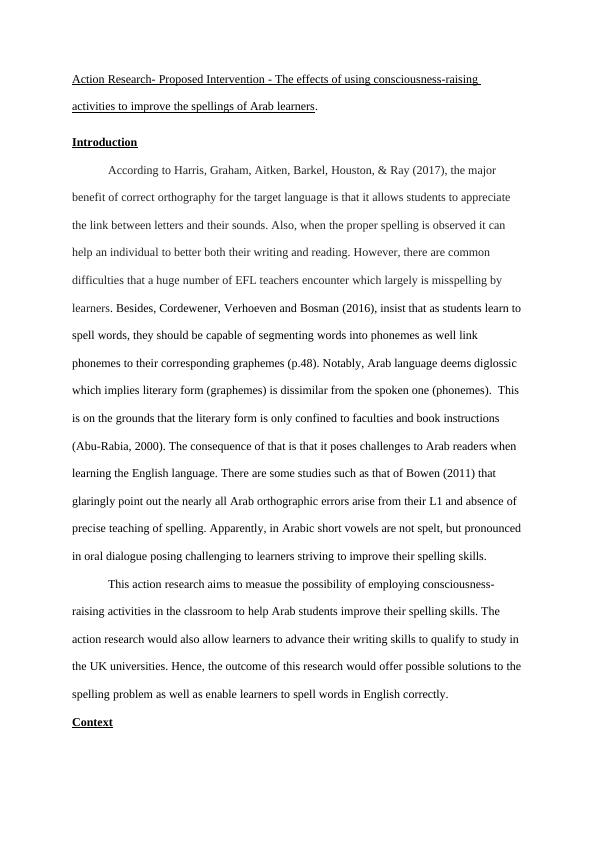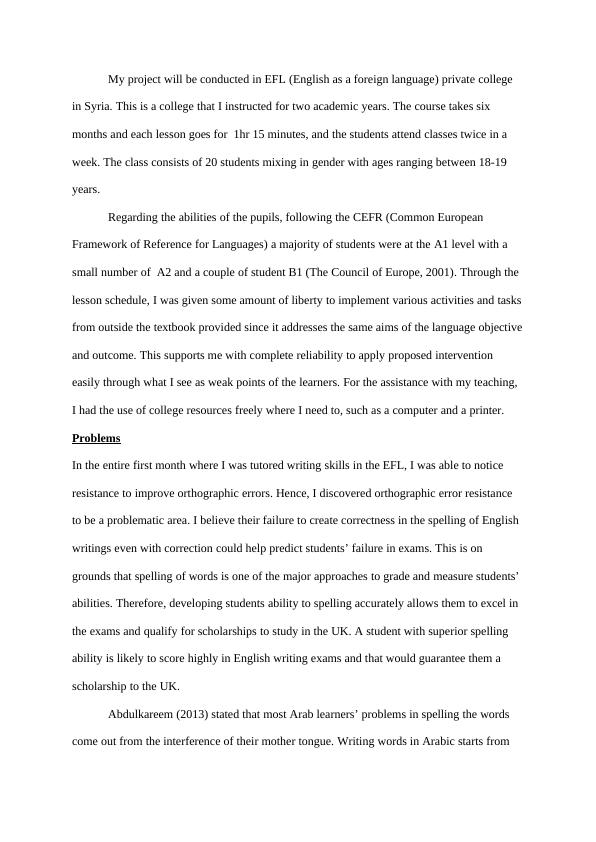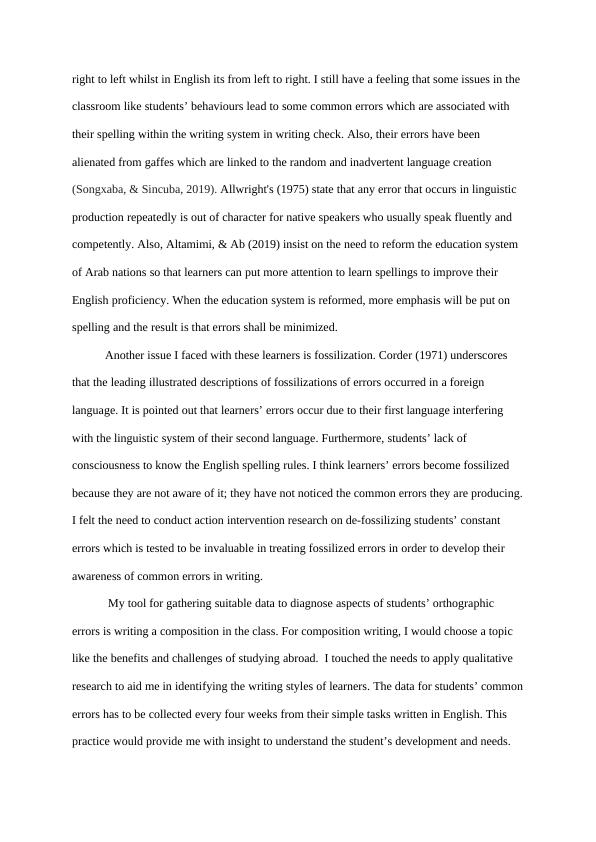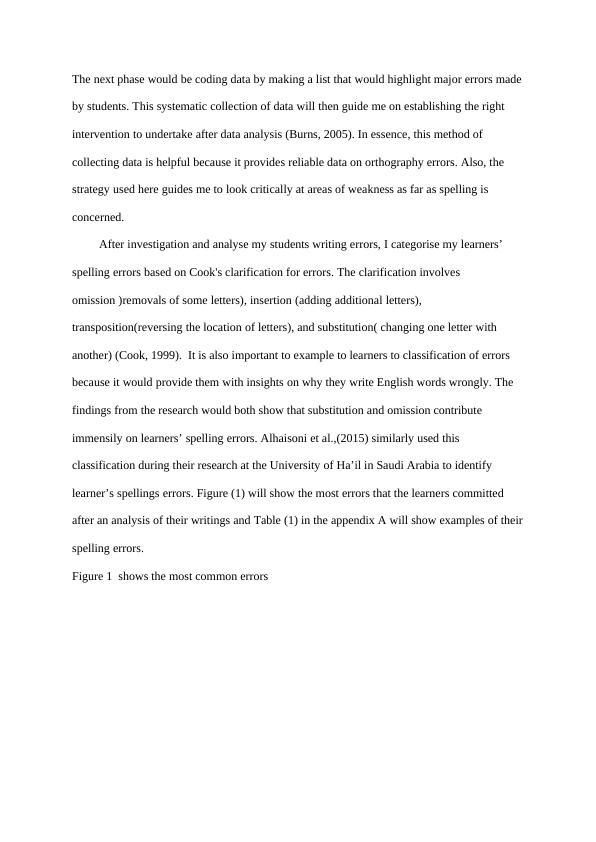Compare Categories Transposition Beutifual
Investigating the effects of consciousness-raising tasks on improving the spellings of Arab learners in an EFL classroom.
16 Pages4334 Words26 Views
Added on 2022-09-07
Compare Categories Transposition Beutifual
Investigating the effects of consciousness-raising tasks on improving the spellings of Arab learners in an EFL classroom.
Added on 2022-09-07
ShareRelated Documents
Action Research- Proposed Intervention - The effects of using consciousness-raising
activities to improve the spellings of Arab learners.
Introduction
According to Harris, Graham, Aitken, Barkel, Houston, & Ray (2017), the major
benefit of correct orthography for the target language is that it allows students to appreciate
the link between letters and their sounds. Also, when the proper spelling is observed it can
help an individual to better both their writing and reading. However, there are common
difficulties that a huge number of EFL teachers encounter which largely is misspelling by
learners. Besides, Cordewener, Verhoeven and Bosman (2016), insist that as students learn to
spell words, they should be capable of segmenting words into phonemes as well link
phonemes to their corresponding graphemes (p.48). Notably, Arab language deems diglossic
which implies literary form (graphemes) is dissimilar from the spoken one (phonemes). This
is on the grounds that the literary form is only confined to faculties and book instructions
(Abu-Rabia, 2000). The consequence of that is that it poses challenges to Arab readers when
learning the English language. There are some studies such as that of Bowen (2011) that
glaringly point out the nearly all Arab orthographic errors arise from their L1 and absence of
precise teaching of spelling. Apparently, in Arabic short vowels are not spelt, but pronounced
in oral dialogue posing challenging to learners striving to improve their spelling skills.
This action research aims to measue the possibility of employing consciousness-
raising activities in the classroom to help Arab students improve their spelling skills. The
action research would also allow learners to advance their writing skills to qualify to study in
the UK universities. Hence, the outcome of this research would offer possible solutions to the
spelling problem as well as enable learners to spell words in English correctly.
Context
activities to improve the spellings of Arab learners.
Introduction
According to Harris, Graham, Aitken, Barkel, Houston, & Ray (2017), the major
benefit of correct orthography for the target language is that it allows students to appreciate
the link between letters and their sounds. Also, when the proper spelling is observed it can
help an individual to better both their writing and reading. However, there are common
difficulties that a huge number of EFL teachers encounter which largely is misspelling by
learners. Besides, Cordewener, Verhoeven and Bosman (2016), insist that as students learn to
spell words, they should be capable of segmenting words into phonemes as well link
phonemes to their corresponding graphemes (p.48). Notably, Arab language deems diglossic
which implies literary form (graphemes) is dissimilar from the spoken one (phonemes). This
is on the grounds that the literary form is only confined to faculties and book instructions
(Abu-Rabia, 2000). The consequence of that is that it poses challenges to Arab readers when
learning the English language. There are some studies such as that of Bowen (2011) that
glaringly point out the nearly all Arab orthographic errors arise from their L1 and absence of
precise teaching of spelling. Apparently, in Arabic short vowels are not spelt, but pronounced
in oral dialogue posing challenging to learners striving to improve their spelling skills.
This action research aims to measue the possibility of employing consciousness-
raising activities in the classroom to help Arab students improve their spelling skills. The
action research would also allow learners to advance their writing skills to qualify to study in
the UK universities. Hence, the outcome of this research would offer possible solutions to the
spelling problem as well as enable learners to spell words in English correctly.
Context

My project will be conducted in EFL (English as a foreign language) private college
in Syria. This is a college that I instructed for two academic years. The course takes six
months and each lesson goes for 1hr 15 minutes, and the students attend classes twice in a
week. The class consists of 20 students mixing in gender with ages ranging between 18-19
years.
Regarding the abilities of the pupils, following the CEFR (Common European
Framework of Reference for Languages) a majority of students were at the A1 level with a
small number of A2 and a couple of student B1 (The Council of Europe, 2001). Through the
lesson schedule, I was given some amount of liberty to implement various activities and tasks
from outside the textbook provided since it addresses the same aims of the language objective
and outcome. This supports me with complete reliability to apply proposed intervention
easily through what I see as weak points of the learners. For the assistance with my teaching,
I had the use of college resources freely where I need to, such as a computer and a printer.
Problems
In the entire first month where I was tutored writing skills in the EFL, I was able to notice
resistance to improve orthographic errors. Hence, I discovered orthographic error resistance
to be a problematic area. I believe their failure to create correctness in the spelling of English
writings even with correction could help predict students’ failure in exams. This is on
grounds that spelling of words is one of the major approaches to grade and measure students’
abilities. Therefore, developing students ability to spelling accurately allows them to excel in
the exams and qualify for scholarships to study in the UK. A student with superior spelling
ability is likely to score highly in English writing exams and that would guarantee them a
scholarship to the UK.
Abdulkareem (2013) stated that most Arab learners’ problems in spelling the words
come out from the interference of their mother tongue. Writing words in Arabic starts from
in Syria. This is a college that I instructed for two academic years. The course takes six
months and each lesson goes for 1hr 15 minutes, and the students attend classes twice in a
week. The class consists of 20 students mixing in gender with ages ranging between 18-19
years.
Regarding the abilities of the pupils, following the CEFR (Common European
Framework of Reference for Languages) a majority of students were at the A1 level with a
small number of A2 and a couple of student B1 (The Council of Europe, 2001). Through the
lesson schedule, I was given some amount of liberty to implement various activities and tasks
from outside the textbook provided since it addresses the same aims of the language objective
and outcome. This supports me with complete reliability to apply proposed intervention
easily through what I see as weak points of the learners. For the assistance with my teaching,
I had the use of college resources freely where I need to, such as a computer and a printer.
Problems
In the entire first month where I was tutored writing skills in the EFL, I was able to notice
resistance to improve orthographic errors. Hence, I discovered orthographic error resistance
to be a problematic area. I believe their failure to create correctness in the spelling of English
writings even with correction could help predict students’ failure in exams. This is on
grounds that spelling of words is one of the major approaches to grade and measure students’
abilities. Therefore, developing students ability to spelling accurately allows them to excel in
the exams and qualify for scholarships to study in the UK. A student with superior spelling
ability is likely to score highly in English writing exams and that would guarantee them a
scholarship to the UK.
Abdulkareem (2013) stated that most Arab learners’ problems in spelling the words
come out from the interference of their mother tongue. Writing words in Arabic starts from

right to left whilst in English its from left to right. I still have a feeling that some issues in the
classroom like students’ behaviours lead to some common errors which are associated with
their spelling within the writing system in writing check. Also, their errors have been
alienated from gaffes which are linked to the random and inadvertent language creation
(Songxaba, & Sincuba, 2019). Allwright's (1975) state that any error that occurs in linguistic
production repeatedly is out of character for native speakers who usually speak fluently and
competently. Also, Altamimi, & Ab (2019) insist on the need to reform the education system
of Arab nations so that learners can put more attention to learn spellings to improve their
English proficiency. When the education system is reformed, more emphasis will be put on
spelling and the result is that errors shall be minimized.
Another issue I faced with these learners is fossilization. Corder (1971) underscores
that the leading illustrated descriptions of fossilizations of errors occurred in a foreign
language. It is pointed out that learners’ errors occur due to their first language interfering
with the linguistic system of their second language. Furthermore, students’ lack of
consciousness to know the English spelling rules. I think learners’ errors become fossilized
because they are not aware of it; they have not noticed the common errors they are producing.
I felt the need to conduct action intervention research on de-fossilizing students’ constant
errors which is tested to be invaluable in treating fossilized errors in order to develop their
awareness of common errors in writing.
My tool for gathering suitable data to diagnose aspects of students’ orthographic
errors is writing a composition in the class. For composition writing, I would choose a topic
like the benefits and challenges of studying abroad. I touched the needs to apply qualitative
research to aid me in identifying the writing styles of learners. The data for students’ common
errors has to be collected every four weeks from their simple tasks written in English. This
practice would provide me with insight to understand the student’s development and needs.
classroom like students’ behaviours lead to some common errors which are associated with
their spelling within the writing system in writing check. Also, their errors have been
alienated from gaffes which are linked to the random and inadvertent language creation
(Songxaba, & Sincuba, 2019). Allwright's (1975) state that any error that occurs in linguistic
production repeatedly is out of character for native speakers who usually speak fluently and
competently. Also, Altamimi, & Ab (2019) insist on the need to reform the education system
of Arab nations so that learners can put more attention to learn spellings to improve their
English proficiency. When the education system is reformed, more emphasis will be put on
spelling and the result is that errors shall be minimized.
Another issue I faced with these learners is fossilization. Corder (1971) underscores
that the leading illustrated descriptions of fossilizations of errors occurred in a foreign
language. It is pointed out that learners’ errors occur due to their first language interfering
with the linguistic system of their second language. Furthermore, students’ lack of
consciousness to know the English spelling rules. I think learners’ errors become fossilized
because they are not aware of it; they have not noticed the common errors they are producing.
I felt the need to conduct action intervention research on de-fossilizing students’ constant
errors which is tested to be invaluable in treating fossilized errors in order to develop their
awareness of common errors in writing.
My tool for gathering suitable data to diagnose aspects of students’ orthographic
errors is writing a composition in the class. For composition writing, I would choose a topic
like the benefits and challenges of studying abroad. I touched the needs to apply qualitative
research to aid me in identifying the writing styles of learners. The data for students’ common
errors has to be collected every four weeks from their simple tasks written in English. This
practice would provide me with insight to understand the student’s development and needs.

The next phase would be coding data by making a list that would highlight major errors made
by students. This systematic collection of data will then guide me on establishing the right
intervention to undertake after data analysis (Burns, 2005). In essence, this method of
collecting data is helpful because it provides reliable data on orthography errors. Also, the
strategy used here guides me to look critically at areas of weakness as far as spelling is
concerned.
After investigation and analyse my students writing errors, I categorise my learners’
spelling errors based on Cook's clarification for errors. The clarification involves
omission )removals of some letters), insertion (adding additional letters),
transposition(reversing the location of letters), and substitution( changing one letter with
another) (Cook, 1999). It is also important to example to learners to classification of errors
because it would provide them with insights on why they write English words wrongly. The
findings from the research would both show that substitution and omission contribute
immensily on learners’ spelling errors. Alhaisoni et al.,(2015) similarly used this
classification during their research at the University of Ha’il in Saudi Arabia to identify
learner’s spellings errors. Figure (1) will show the most errors that the learners committed
after an analysis of their writings and Table (1) in the appendix A will show examples of their
spelling errors.
Figure 1 shows the most common errors
by students. This systematic collection of data will then guide me on establishing the right
intervention to undertake after data analysis (Burns, 2005). In essence, this method of
collecting data is helpful because it provides reliable data on orthography errors. Also, the
strategy used here guides me to look critically at areas of weakness as far as spelling is
concerned.
After investigation and analyse my students writing errors, I categorise my learners’
spelling errors based on Cook's clarification for errors. The clarification involves
omission )removals of some letters), insertion (adding additional letters),
transposition(reversing the location of letters), and substitution( changing one letter with
another) (Cook, 1999). It is also important to example to learners to classification of errors
because it would provide them with insights on why they write English words wrongly. The
findings from the research would both show that substitution and omission contribute
immensily on learners’ spelling errors. Alhaisoni et al.,(2015) similarly used this
classification during their research at the University of Ha’il in Saudi Arabia to identify
learner’s spellings errors. Figure (1) will show the most errors that the learners committed
after an analysis of their writings and Table (1) in the appendix A will show examples of their
spelling errors.
Figure 1 shows the most common errors

End of preview
Want to access all the pages? Upload your documents or become a member.
Related Documents
Phonetic and Phonology: Arab EFL learners pronunciationlg...
|9
|736
|159
Lesson Plan for A Beginner-Intermediate ESL/EFl Group Assessment 2022lg...
|7
|1379
|114
Best Practices in Teaching English Language Learners and General Classeslg...
|2
|582
|377
Intercultural Psychology: Learning Spanish Language and Culturelg...
|4
|748
|362
Assignment about GCU College of Education.lg...
|5
|1091
|160
Unit 6 - Eating and Drinkinglg...
|11
|2816
|49
